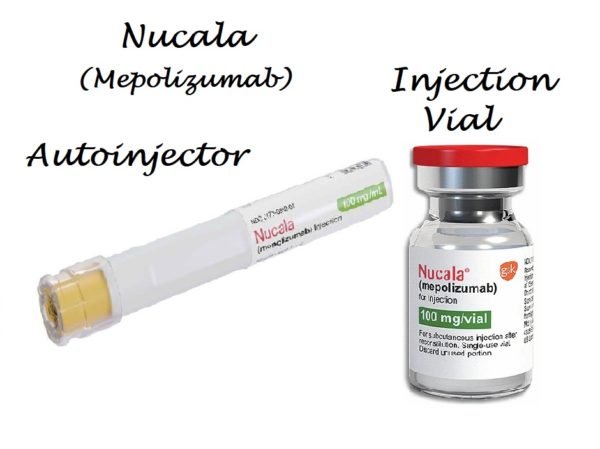A humanized monoclonal antibody called Nucala (Mepolizumab) works by blocking interleukin 5, that is in charge of eosinophil activation, recruitment, and reproduction.
Nucala (Mepolizumab) indications:
-
Asthma:
- It is used as an additional maintenance therapy for adults and kids older than 6 years old who have severe eosinophilic asthma.
- It should be avoided in status asthmaticus and acute exacerbation of asthma.
-
Eosinophilic granulomatosis with polyangiitis:
- As an off-label medication, it is also used to treat Eosinophilic Granulomatosis with Polyangiitis that is refractory or recurrent.
- It is used in the treatment of Churgh-Strauss (eosinophilic granulomatosis with polyangiitis.
Nucala (Mepolizumab) Dose in Adults:
Injection Nucala Dose in the treatment of Asthma:
- 100 mg as a SubQ injection once every 4 weeks
Treatment of Eosinophilic Granulomatosis with Polyangiitis with Nucala (Mepolizumab) Dose:
- 300 mg as a SubQ injection once every 4 weeks
Nucala Dose in the treatment of refractory or relapsing Eosinophilic granulomatosis with polyangiitis (Churgh-Strauss):
- Every four weeks, 300 mg is administered as a SubQ injection together with corticosteroids and either immunosuppressive therapy or corticosteroids alone.
Nucala (Mepolizumab) Dose in Children:
Nucala Dose in the maintenance treatment of severe eosinophilic Asthma as an add-on therapy:
-
Children between the ages of 6 and 11 should get 40 mg subQ once every four weeks.
-
Adolescents and children over 12 years old: 100 mg SubQ once every four weeks.
Mepolizumab pregnancy Risk factor: Undetermined
- Mepolizumab was not studied in pregnant women, but the placental transfer is possible because it is a humanized monoclonal anti-IgG.
- The gestational age also affects the fetal exposure to the drug.
- Uncontrolled asthma can also lead to adverse maternal and fetal outcomes. It should be managed appropriately.
Mepolizumab use during breastfeeding:
- It is unknown if the drug will be excreted into breastmilk.
- Manufacturers recommend that you weigh the risks for the baby and the benefits to the mother.
Dose in Renal impairment:
The manufacturer has not recommended any adjustment in the dose. Adjustment in the dose is not required as mepolizumab is not excreted via the kidneys.
Nucala dosage in Liver disease:
The manufacturer has not recommended any adjustment in the dose, however, mepolizumab is degraded by proteolytic enzymes that are widely distributed. Hepatic impairment, therefore, does not prolong its action and dose adjustment is not needed.
Common Side Effects of Nucala (Mepolizumab) Include:
-
Local:
- Injection site reaction
-
Central nervous system:
- Headache
Less Common Side Effects of Mepolizumab (Nucala) Include:
-
Central nervous system:
- Fatigue
-
Immunologic:
- Antibody development
-
Gastrointestinal:
- Upper abdominal pain
-
Genitourinary:
- Urinary tract infection
-
Dermatologic:
- Eczema
- Pruritus
-
Hypersensitivity:
- Hypersensitivity reaction
- Angioedema
- Type IV hypersensitivity reaction
-
Neuromuscular & skeletal:
- Back pain
- Muscle spasm
-
Infection:
- Influenza
- Herpes Zoster infection
Contraindication to Nucala (Mepolizumab):
Severe adverse reactions to the formulation's ingredients, including mepolizumab.
Cautions and alerts
-
Hypersensitivity reactions
- Angioedema, anaphylaxis, and hypotension are some of the possible causes.
- These symptoms are common in patients who receive treatment within hours.
- It has also been associated with delayed hypersensitivity reactions.
- It can cause severe allergic reactions.
- Patients with severe allergic reactions should be advised to stop taking the medication.
-
Infection
- Patients receiving mepolizumab therapy may develop herpes zoster.
- Before any treatment can be initiated, all patients need to have been vaccinated against herpes.
-
Asthma
- It is not recommended for acute exacerbation or worsening asthma.
- Patients must be using rescue medications in acute conditions such as albuterol.
- Patients with worsening asthma symptoms after mepolizumab administration should consult a physician immediately.
-
Infections with Helminth
- Because an eosinophilic response to helminthic infection is vital, it is unknown if mepolizumab will alter the patient's response to parasitic infections.
- Patients with active infections are advised to be treated before mepolizumab is started.
- Patients infected with mepolizumab should stop taking it until the infection is gone.
Monitor:
- Pulmonary function tests (FEV-1 and peak flow rate)
- Observe for deterioration and improvement in symptoms.
- Overuse of a short-acting beta-agonist is a sign that asthma symptoms are getting worse.
How to administer Mepolizumab (Nucala)?
It is administered by the subQ injection. It is available as a prefilled syringe/ autoinjector and in vials.
- Allow the autoinjector/ vial at room temperature for 30 minutes before administering it.
- To administer the vial's contents, use a polypropylene syringe and a 21- to 27-gauge, 0.5-inch (13 mm) needle.
- Injections into the upper arm, thigh, or abdomen should be made into healthy skin.
- Avoid injecting into a bruised, red, inflamed, hard, or tender skin surface.
- It should be administered by a healthcare provider (under supervision). After training, self-injection using the prefilled syringe or autoinjector may be advised.
- When administering the 300 mg dose, 3 separate injections of 100 mg each may be administered 5 cms apart or more (or inject at different sites).
- To avoid foaming and precipitation, do not shake the reconstituted solution.
Mechanism of action of Mepolizumab (Nucala):
- It functions as an interleukin-5 inhibitor and is a monoclonal humanized antibody (IgG1kappa).
- It is still not known how mepolizumab works in asthma patients.
- However, mepolizumab blocks IL-5, the primary cytokine that regulates eosinophil development, differentiation, recruitment, activation, and survival.
- Mepolizumab inhibits IL-5, which plays a significant role in asthma and inflammation.
- It also reduces the survival rate of eosinophils.
- It may therefore exert anti-inflammatory effects in asthma patients by decreasing eosinophil activation.
Mepolizumab is metabolized by the process of proteolytic degrading (by enzymes distributed throughout the body).
It has a bioavailability of about 80% and a terminal half-life elimination between 16 and 22 hours.
International Brands of Mepolizumab:
- Nucala
Mepolizumab Brand Names in Pakistan:
No Brands Available in Pakistan.







